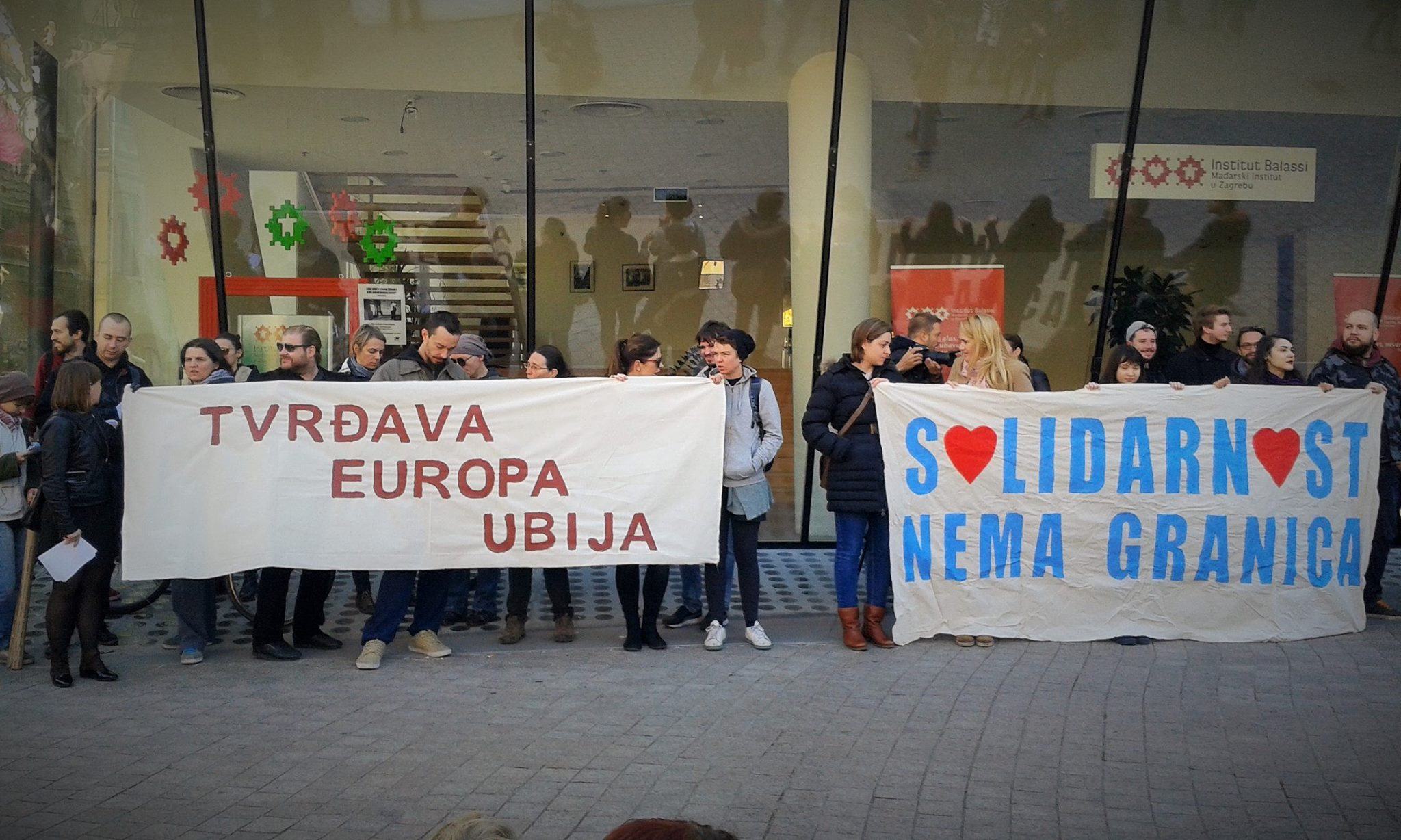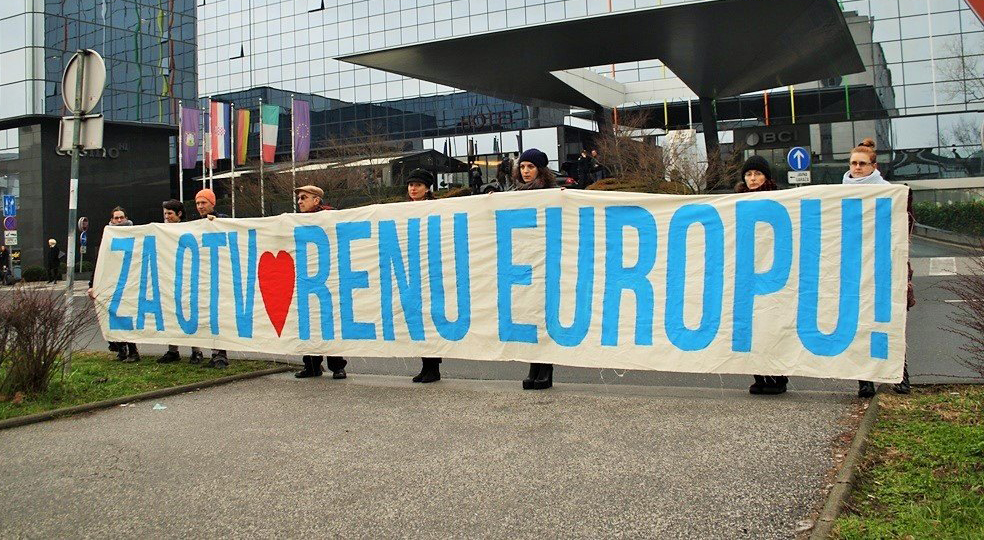This article was written by Maruška Mileta, Zelena akcija/FoE Croatia and YFoEE Steering group member.
Portraying the refugee situation we’ve witnessed since summer 2015 as a ‘migrant crisis’ (as is often done by the media and by politicians) is incorrect. It is a humanitarian crisis and a moral crisis for the European Union. Closing borders, racial profiling, deportations and xenophobia are all manifestations of this crisis.
Over a million people have come to Europe since last year, most going through the so called ‘Balkan route’, with almost 4,000 people having lost their lives trying to cross the Mediterranean in 2015 alone.
Zelena Akcija/FoE Croatia joined a national initiative called ‘Welcome’ which was formed in September last year, with the aim of supporting refugees on the ground, and putting political pressure on Croatian and EU institutions to change restrictive migration policies. The initiative brings together more than 60 civil society organizations, one football club and over 400 volunteers.
We have organised a number of actions in Croatia since the formation of the ‘Welcome’ initiative – from standing in solidarity with refugees on the Slovenian-Croatian border, to marching on the streets of Zagreb against xenophobia and fascism. We are calling for an open Europe for all.
All along the ‘Balkan route’, hundreds of volunteers and civil society organisations have been helping refugees on the ground for months, as well as holding governments and the EU accountable for their decisions. Actions and marches have also taken place in Serbia, Hungary and Slovenia, and activists from these countries and Croatia have been working together on many things – including organising actions and helping refugees to monitori the authorities on the ground.
Only a few Governments have taken responsibility and welcomed refugees, while some western European states, like France and Great Britain, have cracked down on migrants and refugees. This week, the EU and the countries along the ‘Balkan route’ decided to close their borders to all refugees and migrants. This comes after previous measures aimed at either reducing or slowing down the arrival of people to Europe were implemented.
Countries have only been letting through people from Syria and Iraq, and blocking those from so-called ‘safe-zones’ (such as Afghani people having been deported from UK – as it’s been deemed ‘safe enough’), while thousands have been stuck on Greek-Macedonian and Greek-Turkish borders. Some countries have even started deporting people – Finland is the first country that organised the deportation by plane for over 100 Iraqi people. It is important to remember that refugees – especially women and children – who manage to enter Europe can face further violence during their difficult travel to their final destination. But some don’t manage to get there – there are reports of thousands of missing children.
Currently, there are 500 million people living in Europe – but we cannot accept 2 million people who are in need of help? Closing borders is unjust and it’s endangering human lives.

Image: Welcome Initiative, action in Croatia.
Why we need to stand in solidarity with refugees
It’s a complex story when it comes to reasons why people are fleeing to Europe – they are running from war, political persecution, economic distress, famine, environmental degradation etc.
But all these reasons have one thing in common – rich developed countries (predominantly European) are ignoring thier political and environmental responsibilities. Instead they are fueling the climate change that is having a devastating impact on the everyday lives of people from developing countries.
Refugeeism is one of the most visible manifestations of environmental and climate injustice, because many of the refugees lost their homes due to the unwillingness of rich countries to acknowledge and act according to their responsibilities.
To broaden our understanding of migration, we need to recognise it’s historical background.This Tipping Point Collective article explores the root causes of migration, and clearly sends a message that migration is not a bad thing.
‘People by and large do not want to leave their homes, loved ones, ways of life, and cultures in order to suffer horrific journeys across desert and sea only to become subject to hostility, racism, and scapegoating once they enter Europe. But they are forced to, by many compounding, interlinked and not always obvious reasons, both “push” and “pull” — including conflict, political or religious persecution, development projects, dictatorships, poverty, and climate change.‘ – Tipping Point Collective
We should point out who is responsible and why. Some developed countries continue to finance wars, and it’s our role (as a climate justice movement) to also stress that inaction on climate change will inevitably worsen the situation. This article in The Guardian from Friends of the Earth England, Wales and Northern Ireland explains why we need to act on climate change in order to prevent further human catastrophe.
Communities in the Global South that have already on some level been experiencing injustice, be it exploitation of natural resources, wars etc, are now also being faced with having to deal with climate change impacts. 27 million people are displaced by climate – and weather – related disasters each year, and although many of those are internal and temporary migrats (e.g. people rebuild their homes), they undergo huge social and economic consequences. Furthermore, UNHCR predicts that up to 250 million people will be displaced by 2050 as a result of extreme weather conditions, dwindling water reserves, degradation of agricultural land and also due to conflict over natural resources.
Some areas with ethnic, religious, political and other divides coincide with the regions that will be first and worst affected by climate change. To emphasize again, connections can be made between violence, conflicts and climate change. Predictions are that failure in tackling climate change will mean not only disastrous weather events, but also add to national instabilities and lead to further armed conflicts.
We condemn the closing of the ‘Balkan route’. We need to continue to put pressure on developed countries to open the borders – towards an open Europe for all.

